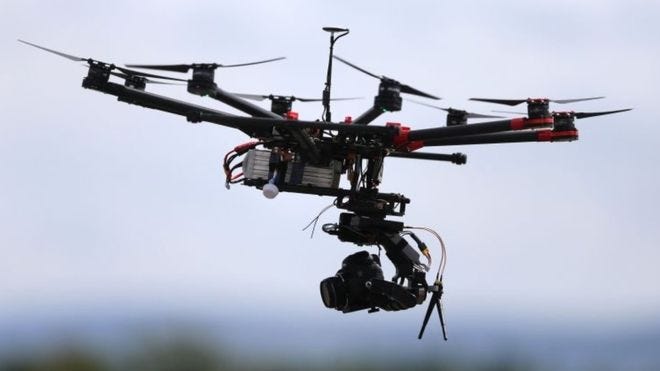Issue #186 - the aftermath of drone sightings at Gatwick Airport; can we gain new senses; training AI in Minecraft; on building trustworthy AI
View this email in your browser
This week - the aftermath of drone sightings at Gatwick Airport; can we gain new senses; training AI in Minecraft; on building trustworthy AI; and more!
The most clicked link in the last week's issue (19% of opens) was the video with Isaac Arthur's predictions for the year 2050.
MORE THAN A HUMAN
► Can We Gain New Senses? Bionics, Implants, And The Umwelt

This video discusses the topic of becoming a bionic being and replacing our senses - sight, hearing or touch, or even adding new senses.
ARTIFICIAL INTELLIGENCE
A look at the surprisingly quarrelsome field of artificial intelligence
Here is a brief look at the field of artificial intelligence that tries to find the middle ground between Ray Kurzweil's and Rodney Brooks ' predictions when artificial general intelligence will arrive (Kurzweil says in 11 years, Brooks says in 182 years).
Aleksander Madry on building trustworthy artificial intelligence
For Aleksander Madry from MIT's Computer Science and Artificial Intelligence Lab (CSAIL) Trustworthy AI initiative, AI is like a sharp knife - a useful but potentially-hazardous tool that society must learn to wield properly. In this short interview, he shares his thoughts on how to make an AI which reasoning we can understand (aka solving the AI's Black Box problem).
In the Quest for General Intelligence, AIs Are Chasing Chickens in Minecraft
Microsoft, Queen Mary University of London, and crowdAI (a platform for data-science challenges) are holding a competition to create an AI agent that could best observe its Minecraft environment, determine which of three missions it had to accomplish, and then collaborate with another AI agent to carry out that mission.
These face-generating systems are getting rather too creepily good for my liking
The title of this article is a bit emotional but other than that it described a recent paper that proposes a new technique for generating pretty realistic human faces.
ROBOTICS
UK now has systems to combat drones

Detection systems are now able to be deployed throughout the UK to combat the threat of drones, ministers say. It follows three days of disruption at Gatwick airport last week, when drones were sighted near the runway. Security minister Ben Wallace said those who use drones "either recklessly or for criminal purposes" could expect "the most severe sentence".
It’s been 14 years since the first Dutch police drone — why are they still barely used?
Amsterdam police started using drones back in 2006. They were used in some cases but then they were grounded. This article tells the story of Amsterdam's police drones, why did they fail and why they might come back.
We Have No Idea How to Deal With Unexpected Drones at Airports
The recent chaos at Gatwick Airport caused by an unidentified drone showed how unprepared we are for this kind of threat. In recent years, a number of ways to deal with rogue drones have been developed, like using lasers, signal jamming guns and even eagles, but no one tested them in a real-life environment.
The Next Great Leap Forward? Combining Robots With the Internet of Things
This article describes the possibilities of the robotic Internet of Things (IoT) - a system where all robots are connected and share information with each other to achieve a greater goal.
DHL will invest $300 million to quadruple robots in warehouses in 2019
DHL Supply Chain, a logistics division of DHL, announced it will invest $300 million to modernize 60% of its warehouses in North America with more IoT sensors and robots.
Robots Finally Learning to Clean the Bathroom
At World Robot Summit in Japan, Team Homer at the University of Koblenz-Landau, Germany, showed a robot that can clean the bathroom. The future is here.
BIOTECHNOLOGY
We Need More Diversity in Our Genomic Databases
This article calls for more diversity in the genomic databases. The underrepresentation of nonwhite ethnic groups in scientific research and in clinical trials is a disturbing trend, it states. The implications of this problem in the limited realm of clinical trials have been reported, but the roots of the disparity run much deeper.
Thank you for subscribing,
Conrad Gray (@conradthegray)
If you have any questions or suggestions, just reply to this email or tweet at @hplusweekly. I'd like to hear what do you think about H+ Weekly.
Follow H+ Weekly!



